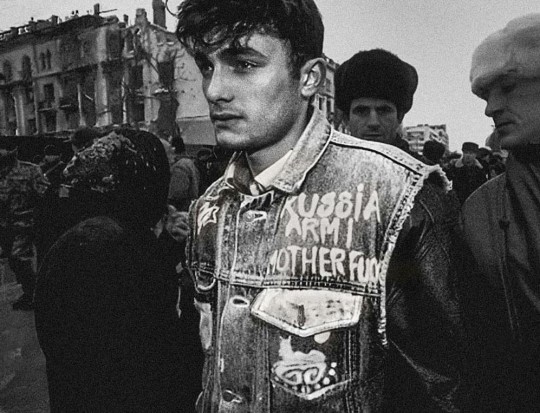Don't wanna be here? Send us removal request.
Text
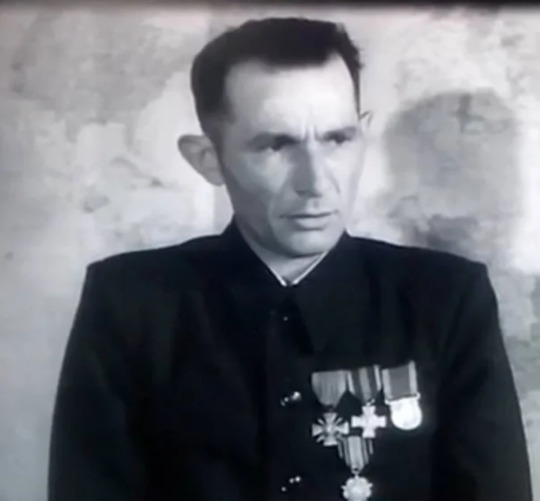
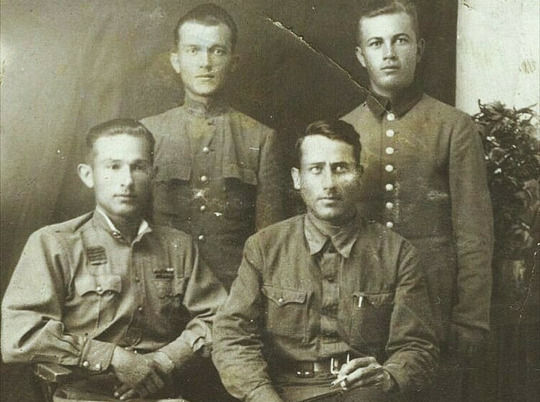
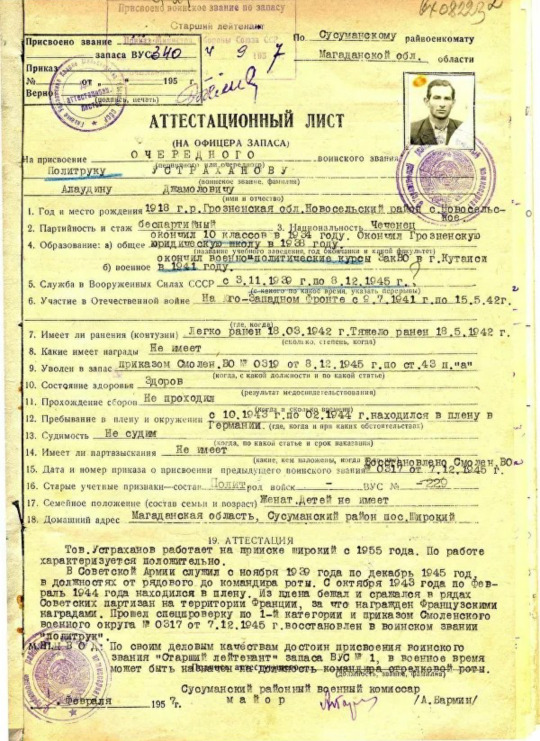
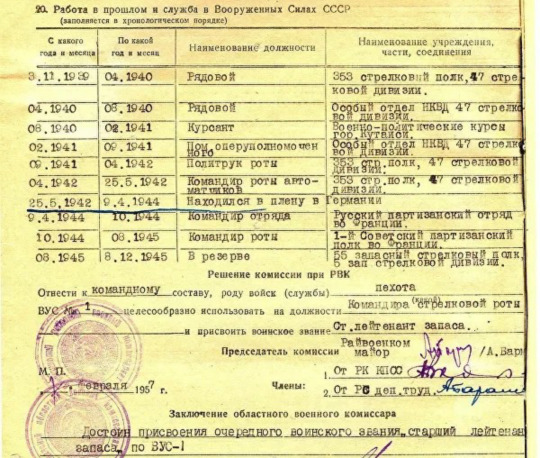
Alavdi Ustarkhanov was born on December 27, 1918 in the Achkhoy-Martan district of Chechnya into a simple family. He received a fairly good education. After finishing school in Grozny, he went to the regional courses of the Soviet apparatus at the North Caucasus Regional Executive Committee, where senior secretaries were trained. In 1936 he became the head of the Achkhoy-Martan district of the VLKSM committee. Ustarkhanov moved up the party ladder very successfully. His biography indicates that he was fluent in French and German.
Alavdi Ustarkhanov was drafted into the military service in 1939 and a year later he joined the ranks of the OO (special department) of the NKVD. His military career went uphill, in 1942 Ustarkhanov received the position of company commander and became a member of the CPSU (b), but not for long. He was captured on May 25.The Germans sent him to a concentration camp. Unsuccesfully, he escaped from the concentration camp several times, but the camp guards caught him with the help of specially trained dogs.
Finally, Alavdi succeeded in escaping from captivity on his third try, moreover, not alone, but with a wounded Frenchman. French sources report that Ustarkhanov carried a friend practically on himself through the Alps.Alavdi and the French soldier managed to reach the fighters of the anti-Nazi Resistance (Maki).
In the end, they got to France, where Alavdi joined the resistance movement led by Charles de Gaulle. And since it was difficult for the French to pronounce the name "Alavdi", he received the nickname "Commander André." At first, he became the commander of a partisan detachment, then the commander of the 8th company of the 1st Soviet order-bearing partisan regiment in France. After the war ended, Commander André personally received the Legion of Honor and other awards from De Gaulle.
The French persuaded the commander to stay in their country forever. But Alavdi really wanted to see his relatives back home in Chechnya. Alavdi returned to the USSR and seems to have begun a peaceful life, however later on was arrested and declared traitor to the Motherland because he was once captured by German troops. This was told by Yahya Ustarkhanov. The French hero was exiled to Kazakhstan, and then to Magadan for 10 years. Returning to his native village, Alavdi refused to join the party again, as he was offended by the authorities and said that he would not join its ranks until he was given the well-deserved title of a hero.
Alavdi worked as an excavator driver and did not expect changes in his fate. But in the spring of 1960, Nikita Khrushchev met in Paris with Charles de Gaulle, where the head of France asked: "How is our commander André?" The Soviet leader did not even understand who he was talking about, but replied that everything was fine with him. Then De Gaulle asked to tell Commander André that his fellow soldiers wanted to visit him. Returning to the USSR, Khrushchev issued the necessary instructions, and Alavdi’s house was repaired. In 1964, French guests came to Ustarkhanov. And they arrived not empty-handed, but brought a motorcycle as a gift - the same one on which Commander Andre fought in France. Evil rock. The day the guests left, Alavdi went to Grozny ride his motorcycle. And returning home, he lost control of the motorcycle and fell into the river, where he died.
After the death of Ustarkhanov he was titled the hero of the Soviet Union, yet never received the star. The name of this man is better known in France, than in in his homeland. In Cannes, for example, there is the Commandant André Street.Also his name is one of the first carved into the monument for the veterans of "La Resistance" - the French resistance.
In Addition to that that ,the street in Achkhoy-Martan, on which Alavdi grew up, is named after him. His only son still lives on this street - Yahya, an elderly man, who for many years tried to preserve and increase the memory of his heroic father.
5 notes
·
View notes
Text

Алавди Устарханову (Командор Андре)
Там на войне ни смерть, ни плен - не редкость,
Неважно кто ты, чеченец иль француз,
Пока в душе есть мужество и верность,
По мере сил, всяк тащит этот груз…
Побег из плена может стать последним...
Овчарки настигают каждый раз…
Безумный шаг, по сути, был он верным,
Но мог приблизить смерти горький час…
За каждый свой поступок мы в ответе,
За каждым, словом тень добра и зла.
Немало их зажравшихся на свете,
Кому доход несет всегда война…
Алавди вновь уходит от погони
И под ногами зыбкий горный грунт,
Француз в бреду роняет только стоны,
Одна надежда горы не сдадут.
Несет чеченец раненного друга
И каждый шаг дается нелегко…
Лекарства нет больному от недуга
На склонах гор не видно никого…
Обратный путь в концлагерь им заказан,
Настигнув немцы до смерти забьют...
А смерть она всегда бывает рядом,
Но близко не была еще как тут…
Двенадцать тысяч было добровольцев,
По зову сердца, что ушли на фронт…
Земля Чечни рождала ратоборцев
Героями гордился весь народ.
И сдержанность, и дерзость, и отвагу
По генам могут предки передать…
Алавди первым шел всегда в атаку
И дух бойцов умел он поднимать…
И Франция отметит путь Героя,
Награду вручит Генерал Де Голль,
За то, что не давал врагам покоя
И как свою, французов принял боль.
Свой каждый шаг он местью правой мерил…
Ни смерти или плена не страшась…
И как француз, чеченец душой верил
Что смерть врагов приблизит этот час...
На Родине у власти правят силы
С французами ни как их не сровнять…
А сколько душ в Чечне они сгубили?
Невинных душ теперь не сосчитать…
По той причине жизни там не будет,
Судьбе доверься командор Андре.
В стране чекистов ветер смерти дует
И черный ворон есть в любом дворе…
Любовью к родине слепа душа святая
Как мотылек, летящий на огонь...
Жива лишь память горькая седая
И та вместится в детскую ладонь.
Не торопись расправить свои крылья,
Из прошлого извлечь пора урок
Твой каждый шаг и слово встретят в клинья
Чеченцам нет свободных там дорог...
Пока есть время, раны залечи,
Забытый код никто не расшифрует
На родине у власти палачи…
Свинцовый ветер смерти еще дует…
Леча Ясаев
0 notes
Text


Ali Adaev he is the author of the famous words: “Hunt them, down 1arg yali,” and “Alik, take the guys away.” // In 1992, Chechens went to Abkhazia, in Kabardino-Balkaria they were stopped by Russian soldiers. During the search, realizing that they were volunteers from Chechnya, the military pointed machine guns at them and ordered them to surrender. At this moment, Ali grabbed one of them and pulled the check out of the grenade, ordered the rest of the staff to drop their weapons, and to the one he grabbed, he said: “Dance!” He asked in a trembling voice: “What to dance?”, And Ali answered: “Lambada!” Since then, he got his nickname Ali "Lambada" Adaev.
Ali Adaev died heroically on January 3, 1995, in the area of the “mound of military glory”, not far from the railway station, where Bilal Akhamadov, a Chechen television operator and Rizvan Abumuslimov, the younger brother of Sayd-Khasan Abumuslimov, died with him.
Allah g1azot kobala doyla ceran!
6 notes
·
View notes
Text




58 notes
·
View notes
Text


The lack of the required number of firearms led to small-scale production in 1992 at the facilities of the Grozny Machine-Building Plant "Red Hammer" of a 9-mm K6-92 Borz submachine gun of its own design. It was designed for a 9-mm cartridge Makarov pistol and allowed the conduct of single or automatic fire.
The maximum simplification of the design, the use of non-weapon and tool steel grades, the use of only stamped parts led to the fact that the Borz was distinguished by low barrel survivability, incomplete combustion of powder gases and their abundant emission during automatic firing.
13 notes
·
View notes
Text

Айдамиров Абузар
Ненан мотт
Со вина Кавказан ломахь,
Къоьжачу баххьашна юккъехь.
Аьрзунийн баннашна уллохь
Нанас со кхиийна берахь.
Цигахь со набарна товжош,
Цо олу аганан илли.
Декара, дог хьоьстуш довха,
Сан нохчийн маттара илли.
Сарахь цо туьйранаш дуьйцуш,
Со цунах хьерчара кхоьруш,
Я халкъан илли цо олуш,
ДIатуьйра набаро хьоьстуш.
Шаьш хьегна баланаш балхош,
Вайн халкъан турпалхой хестош,
Дайн-дайша даьхна и иллеш
Декара, дог Iийжош, доруш.
Цу иллийн дешнашца гора
Даймехкан исбаьхьа суьрташ,
Маршоне, Даймахке безам
Вайн дайша къийсамехь гайтар.
Ненан мотт, хьуна тIе тийжаш,
Хьоьца шен баланаш балхош,
Хьоьца шайн дог-ойла гIиттош,
Ловш Iийна уьш буьрса денош.
Хьоьца ду суна мел дезнарг,
Вина мохк, нанас сан хьестар.
Хьоьца ду сан велар, велхар,
Дахаре сан болу безам.
4 notes
·
View notes
